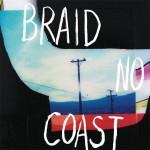
Braid No Coast
(Topshelf)
Braid’s first album in sixteen years comes off the back of a nostalgia tour in which they played their cult classic Frame & Canvas in its entirety. Released towards the back-end of the mid-90s US emo golden age in 1998, it wouldn’t be right to single it out as an influential record per se; it isn’t even a particularly experimental record, but it’s definitely a fucking brilliant one, a touchstone for anyone playing emo since it came out. There are DIY emo scenes thriving across the world over the last few years, full of bands who’ve obviously cut their teeth on the likes of Cap’n Jazz, Sunny Day Real Estate, and Rites of Spring. And if I were to pick one record that encapsulates everything great about this specific emo lineage and unites so many bands I’ve seen at DIY shows, I could do no better than Frame & Canvas.
All I feel compelled to say about No Coast is that it’s a cleaner, more forgettable recapitulation on what made Braid (and indeed a lot of their peers) the kind of band people lose their shit over. Braid were not a heavy band, but achieved a physicality in their songs’ habit of reflexively reacting to their own riffs, jagged yet consistently exhilarating; on paper incongruous, in action as natural as catharsis. No Coast has similar ingredients – quick riffs with leaping intervals, juxtapositions of stasis and syncopation, big thick chords – but comes across more as pastiche than a continuation.
The glossier production and much more controlled vocal delivery (Braid are in their 40s now and perhaps wisely forego shouted choruses) means that the lyrics stick out more than usual – which isn’t to play up their strengths. Put Some Wings On That Kid’s title alone, for instance, exemplifies their penchant for quirky, oft-unsubstantiated half-wordplay. They drop a few sixth-form-poetry clangers, like including the words “solace” and “serenity” in the first couplets of Lux, and a few dull clichés (“I’m a runaway train!”, yells Bob Nanna, failing to convince, at the climax of Bang). I imagine No Coast’s inevitable detractors’ go-to quote will be the “Someone please! Call the police! I’m falling out of my seat!” from the chorus of Damages! Mostly, however, it’s merely forgettable rather than conspicuously bad.
Sometimes though, the results are pretty strong – East End Hollows and Many Enemies are more methodical, more conventionally structured than the Braid of old, and much catchier when they hit their stride. Yet their straightforwardness is often a letdown – the drum patterns often turgid (Pre Evergreen in particular), the guitar riffs failing to inspire or offer any surprises, and the back end of the record drags into one without you noticing.
Closing track This Is Not A Revolution perhaps cheekily alludes to the band’s sonically conservative late style, in its rhythmic simplicity and elegant backing vocal parts as well as its title – its multi-layered conclusion is one of the album’s most finely-crafted moments, as well as the most un-Braid-like. But that’s the problem with No Coast; it needs a more tangible emotional charge. What it most sorely lacks is spontaneity.
12 August, 2014 - 04:12 — Stephen Wragg